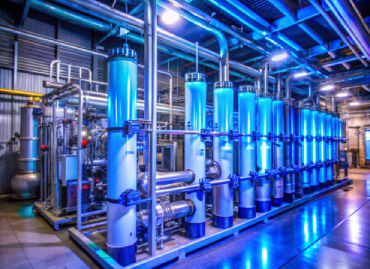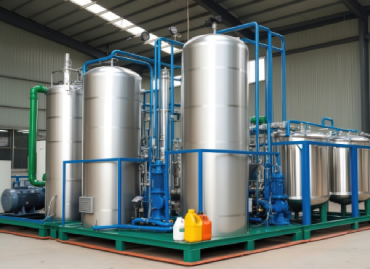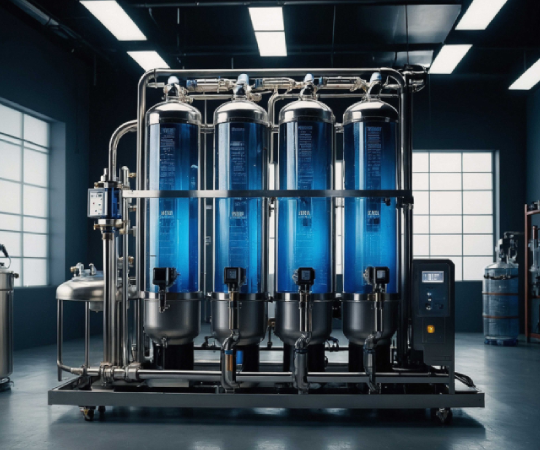- By Admin
- 02 Sep 2025
- ETP Plant
Advanced Water Treatment Solutions Ensuring High-Purity Battery Water Production and Sustainable Wastewater Management
uring ecosystem, playing a crucial role in the production and servicing of batteries. As sectors like automotive, electronics, and renewable energy storage expand rapidly, the demand for high-quality battery water is steadily increasing. Ultra-pure water, free from any contaminants, is essential for manufacturing lead-acid and other battery types, ensuring their efficiency and longevity. The need for stringent water quality management is critical in these industries, as even trace amounts of impurities can compromise battery performance and safety.
The state of Maharashtra, with its bustling industrial hubs like Pune, Aurangabad, and Nashik, has become a key player in this market. As manufacturers rely on precise water treatment systems to ensure the safety of their products, they are also tasked with managing wastewater efficiently to adhere to environmental standards. Understanding the importance of both water quality and wastewater treatment, battery water manufacturers are investing in advanced technologies like Reverse Osmosis (RO), Effluent Treatment Plants (ETPs), and Zero Liquid Discharge (ZLD) systems to safeguard the environment while optimising production.
"Water, in the realm of battery manufacturing, is not just a resource—it's a core element of product integrity. The purity of water directly influences the performance, longevity, and safety of batteries. Through responsible treatment, we ensure both quality manufacturing and environmental sustainability, safeguarding future energy storage innovations."
The Importance of Ultra-Pure Water for Battery Manufacturing
In battery manufacturing, water must be free from minerals, salts, and ions, as even the smallest contaminants can lead to internal corrosion or malfunction in the battery cells. This is why industries rely on systems like RO and Demineralisation (DM) to ensure the production of ultra-pure water. These processes are designed to remove all dissolved solids and contaminants from the water, ensuring that it is of the highest quality before being used in the manufacturing process.
Battery water is not only used in the initial production of batteries but also in the maintenance of existing batteries. It is employed for topping up old batteries and cleaning components to avoid contamination. In addition, high-quality water is crucial for maintaining machinery and preventing buildup inside the factory premises. Without effective water treatment, battery manufacturing would not meet the stringent quality standards required for product safety.


Wastewater Generation in Battery Water Production Plants
The process of purifying water for battery manufacturing involves multiple steps, and while the goal is to produce ultra-pure water, these operations also generate significant amounts of wastewater. For example, during the RO process, large quantities of water are rejected, carrying concentrated salts, metals, and sometimes chemical additives that cannot be discharged directly into the environment. If left untreated, this wastewater could lead to contamination and environmental damage.
Moreover, wastewater is generated from the routine cleaning of tanks, filters, and equipment, which often contains detergents and sanitising agents. These waste streams, while essential to the production process, must be treated to prevent contamination of the surrounding environment. As water scarcity and environmental regulations become more pressing, managing these waste streams has become an increasingly important focus for manufacturers.
Effluent Treatment and Water Recovery Systems
Effluent Treatment Plants (ETPs) are widely used to treat wastewater generated from the production processes in battery water industries. These systems work by neutralising pH, removing heavy metals, and reducing the Total Dissolved Solids (TDS) content to meet regulatory discharge standards. Some plants are even going a step further by implementing Zero Liquid Discharge (ZLD) systems, which ensure that no wastewater is discharged into the environment. These systems are designed to recover as much water as possible through processes like RO and membrane filtration, leaving behind a smaller volume of high-salinity brine that can be treated for disposal.
In addition to ETPs, some facilities use advanced filtration technologies like Ultrafiltration (UF) and Nanofiltration (NF) to purify wastewater, allowing it to be reused in various operations within the plant. This not only helps reduce water wastage but also lowers operational costs by minimising the need for fresh water.
Innovative Solutions for Sustainable Water Management
As the demand for battery water increases, the industry is turning to smart water management solutions to optimise both water treatment and wastewater disposal processes. By incorporating automation and IoT technologies, manufacturers can monitor real-time water quality parameters like pH, conductivity, and hardness. This data helps ensure that water meets the strict quality standards required for battery production while minimising waste and improving overall efficiency.
Additionally, adopting advanced water recovery systems can help plants reduce their reliance on external water sources, which is especially important in water-scarce regions. Innovations like ZLD and advanced membrane filtration techniques enable battery water plants to recycle and reuse large volumes of water, making them more sustainable and environmentally friendly.
Summary And Conclusion
Battery water industries in India play an essential role in the manufacturing of high-performance batteries. However, as the demand for ultra-pure water grows, so does the challenge of managing wastewater effectively. Advanced water treatment technologies like RO, ETPs, and ZLD systems are crucial for ensuring the production of high-quality water while minimising environmental impact. With innovations in water recovery and real-time monitoring, manufacturers can improve operational efficiency and sustainability. By investing in customised treatment solutions, battery water industries can continue to meet rigorous quality standards, reduce water wastage, and ensure a safer and more sustainable future for the industry.































































